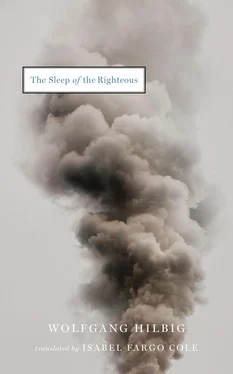Oh, how long these memories had led a life of their own, suicidal and shading into insanity. — What was left of the old woman, thought C., had long since been seized by a ferment of madness and little by little was being ravaged. — In some way, he thought, he was bound up with those memories that lay there swathed in thick, worn clothing, buried beneath woolen, coal-smelling blankets. — In some strange, barely explicable way, I am bound up with these memories, and no doubt I dread the moment in which they’ll descend into utter confusion, flickering and vanishing into the void.
I only need to stumble on my way to the mailbox, and already everything comes back to me. My foot only needs to catch on the uneven pavement, and at once I feel cast back into that time made up of never-ending winters. Of black winters covering other winters, black and long-decayed. And I ask myself over and over what I never asked myself then: What is it that lies beneath us? Bygone clans lie there beneath us. Long-forgotten clans lie down there, clans no one now asks about, clans long fermented to coal, clumped together blackly, clans rising up at night against the life that lives on above them. Rising up like the ferment of memories, like endless tribes of memories no one knows of now. And I am, yet again, the uncounted member of a clan surnamed Choléra that once set out early in the morning, at an inhuman hour, into the cold and the darkness that lay over the coal and over the ash. Ash lay over the coal, and coal lay over the ash. And my past lies down there, I thought, down beneath the coal, beneath the ash.
And I recalled one day when I’d tried to ask my colleague Gunsch about his background. One Sunday, the day after Christmas, the watchman had brought down a letter from the section head assigning me to the night shift in a different boiler room on Monday, December 27, because someone had called in sick. I didn’t mind, it considerably shortened my way to work, but I immediately asked myself whether Gunsch had complained about my fit of rage two days before. I watched him as we worked and concluded that there was some dark thing in his obtuse skull that no light could be shed on. — No, he certainly hadn’t complained, he had no interest whatsoever in demanding any rights. He might not even have been able to formulate a complaint; his capacity to express himself was so stunted that he no longer even understood what he was subjected to, short of pure physical pain. Moreover, he didn’t even seem to believe in the necessity of disputing things. And when I thought about it, a similar reluctance or inability had arisen in me as well. — And so we’re two creatures of the dark, used to keeping silent, I thought, and there are probably few things left in our minds whose expression would give another person any pleasure.
Perhaps it’s that we’re unable to love the world enough anymore. Why should we tell ourselves things about a world that matters less and less to us?
In other eras you’d set your memories before the world, convinced they’d find listeners or readers in coming times. But no one believes in coming times now, at least not here, in the class we belong to.
At the end of the shift, while we waited to be relieved, I did try to strike up a conversation with him. It was rather one-sided: Did you hear? Tomorrow I’ll be sent off again to a different boiler room, tomorrow evening. .
There was no sign that I’d been heard. The old man had returned from the showers and sat in the common room in his coat, wet hair plastered to his skull, audibly slurping the last of his coffee from his thermos cup.
Starting tomorrow you’ll be on your own again, Gunsch! Too bad for you, it’ll be quite a slog. But I have the feeling you don’t care one bit. .
He seemed to nod. Or did he merely sink his black watery gaze still deeper into the coffee cup, turning it in the black fingers of both hands?
Say, what neck of the woods are you from, Gunsch? My grandfather was Polish too. . we might even have been countrymen if certain things had happened differently. But then we’d probably just be shoveling coal in Poland or the Ukraine. .
For a moment he showed a strip of pink gums with scattered yellow teeth in them; he seemed to grin. He’d jerked his thumb over his shoulder, toward the common room’s coal-dust-smeared skylight; it seemed to me he’d mumbled a few words. If you followed the motion of his thumb, Gunsch had pointed across the mine pits, the direction indeterminate; perhaps he’d pointed in all directions, perhaps he’d described a circle whose trajectory lay in infinity. That afternoon the leaden hue of the sky merged on all sides with the vapors that rose from the freezing sheets of water at the bottoms of the mine pits; ever since morning an opaque atmosphere had ringed the whole horizon. When you came up the stairs from the boiler room, there was a smell of snow and glowing ash.
Maybe you don’t have any family, Gunsch? No relatives. . no relatives left? — I’d lost my confidence, my talk about “countrymen” seemed foolish; what nonsense, when speaking of regions that seemed to have no fixed borders. — I hadn’t even been able to find my grandfather’s hometown on the map. And it had never seemed to interest him which country he belonged to. When I thought of the mix of peoples in the chaos of regions Gunsch came from, of course he was no one’s “countryman” in the strict sense. If you came from there, you were a leftover person, remembered by no one.
He grinned again and pointed his thumb at the floor, averting his eyes; there was a dull dog’s look in them: They’re all under the ground. .
Those were perhaps the only words he’d ever really directed at me. And I asked myself whether I’d even understood him right. It didn’t matter exactly what he’d said, at any rate he must have meant more or less what I had heard. — Walking back from the mailbox, it surprised me that I’d forgotten the words so quickly: They’re all under the ground. .
All at once I wondered if most people on this street weren’t living with similar sentiments. . Quite possibly that was the case! — Weren’t they all, in some peculiar fashion, strangers? Of course they lived together, often harmoniously in their way, within their families they shared the quandaries and paltry pleasures of their existence, but they knew at all times how quickly they could lapse into oblivion. . weren’t they all forgotten the moment they stopped going to work? — They have a view of life focused on the bare present, thought C., on bare survival, on scraping by. — That’s how they put it, you hear them say it often enough.
There was something disquieting in that: a feeling he only came to know once he’d already escaped from this existence. Ever since he’d begun to call himself a writer, he was gnawed by the suspicion that it was the lack of memories that thwarted him as a writer, that brought him to the verge of failure: the gaps in his memory, the incoherencies, the impossibility of reconciling spaces and times. .
How many times he’d returned to the flat from his trip to the mailbox and first listened for a while at the door to the small back room where his mother slept. — Was she still breathing? — Dread filled him when he couldn’t instantly hear her noisy struggle to breathe, when her restless tossing and turning on the mattress was not immediately detectable. It was a noise as though the decrepit springs were slackening beneath the old woman’s ever-lighter body and softly beginning to sing. — It’s true, he thought, her body seems to be dwindling. And one day these fatigued springs of steel, these untuned strings, will cease to sing.
For a long while he sat in the kitchen with the door open and listened for noises from the back room. Sometimes it seemed, however hard he concentrated, that not another sound emerged. Muteness slipped under the door, flowed soundlessly down the narrow corridor, and began to spread like a cool breath of air in the kitchen. There, beyond the corridor, was a hermetic chamber filled with memories that pressed dumb and dark against the closed door; now speechlessness engulfed him even in the kitchen. And muteness reigned too on the floors below and above him; nowhere in this building, inhabited mainly by the aged, was there a sound, even on the street outside nothing more could be heard. He felt he could barely breathe now in this stillness, in the impalpable substance of the stillness. It was the hour when the town seemed utterly extinct. . always around the time when he jotted down a few inconsequential lines. On letter paper or a postcard: apologetic lines, sounding as though the writer’s sole intent were to give just one more sign of life. . lines that would arrive in Berlin at some point, whose blue, shaky, dwindling script was the only proof that he existed. And that he then took to the mailbox, and sometimes this outlying part of town was so still that he feared his scurrying steps made too much noise. And then, almost aimlessly, he walked past the mailbox and on another hundred yards to the intersection beyond which the center of town lay. It was as still as though the memory of his steps, of his stumbling, had been the last possible sound in this town. But soon, perhaps in another quarter-hour — you could already hear them from afar — it would be time for the first long-distance trucks to thunder from the left down the street that cut off his little neighborhood from the town proper. Now, at this still-nocturnal morning hour, the huge freight trains heading northward to Leipzig hurtled past the residential district at a reckless speed. Gusts of wind filled with ice shards and filth lashed into him. Though he stood on the sidewalk behind the guardrail, he felt a force that nearly made him reel back into the muddy grass behind him. When the deafening monsters passed through the town’s periphery, they blew a warning with their horns; the long drawn-out howl, the blaring din of their passage, penetrated deep into the district to which, his hearing nearly obliterated, he now turned back.
Читать дальше












